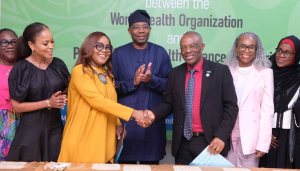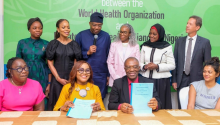Strategic partnerships towards transforming health systems and outcomes in Nigeria. Strategic partnerships towards transforming health systems and outcomes in Nigeria.
Abuja, 5 August, 2024 - Embarking on a transformational journey towards improving Primary Healthcare services in Nigeria, the World Health Organization (WHO) and the Private Sector Health Alliance of Nigeria (PSHAN) have officially launched a groundbreaking collaboration under the "Adopt-A-Healthcare Facility Programme" (ADHFP).
The ADHFP initiative aims at establishing at least one global-standard Primary Healthcare Centre (PHC) in each of the 774 Local government Areas(LGAs), aligning with the guidelines of the Health Sector Renewal Investment Programme of the Federal Ministry of Health and the agency in charge of PHC, the National Primary Health Care Development Agency (NPHCDA).
In his keynote address, Dr Walter Kazadi Mulombo, WHO Country Representative in Nigeria, highlighted that the project is in support of President Bola Tinubu’s Renewed Hope Agenda and the 77th World Health Assembly resolution on “Economies of Health for All” in recognition of the need to increase the engagement of nongovernmental actors, including the private sector, towards contributing to equitable health and well-being for all.
“I am happy to note that this unique partnership between WHO and PSHAN which we commemorate today, responds to the request of the member states to the WHO in the 77th World Health Assembly resolution on “Economies of Health for All”, and is consistent with the WHO’s offer to the Government of Nigeria as encapsulated in the 4th Generation Nigeria Country Cooperation Strategy (CCSIV)”.
Dr Mulombo reflected that the project aligns with the national health policy, which aims to strengthen primary healthcare and ensure better health outcomes for all Nigerians.
He explained that WHO will be providing technical support to Nigeria on domestic resource mobilization and other fiscally sustainable ways to finance the progressive realization of achieving universal health coverage and the highest attenable primary health care services as well as addressing broader social determinants of health while ensuring health systems are strengthened, prepared and resilient to respond to outbreaks.
“This partnership aims to leverage the comparative advantages of our two organizations to accelerate primary healthcare revitalization towards the achievement of Universal Health Coverage and health security in Nigeria.
A Leap Towards Health System Strengthening.
Dr Tinuola Akinbolagbe, Managing Director/ Chief Executive Officer, PSHAN expressed enthusiasm that ADHFP represents a vital step in the journey towards a robust healthcare system as it aligns with the sector-wide approach of the Federal Ministry of Health to healthcare delivery.
“By bringing together the diverse expertise, resources, and perspectives of the public and private sectors, academia, civil society, and international agencies, we lay the foundation for realizing UHC. With this partnership, we aim to leverage the strengths and resources of both partners to address pressing health challenges and improve health outcomes across the country.
Dr Akinbolagbe underscored the program's potential to inspire other private entities to participate in healthcare initiatives. “Together, we have the power to shape a future where healthcare is not merely a privilege but a fundamental human right, accessible to all, irrespective of socio-economic status or geographical location,” she noted.
The Road Ahead
As you may recall, the WHO and the PSHAN signed the Memorandum of Understanding (MoU) earlier in Abuja on 4 April 2024 and witnessed by the Honourable Coordinating Minister of Health and Social Welfare, Professor Mohammadu Ali Pate, and the NPHCDA executive Director, Dr Muyi Aina.
It is worth mentioning that the Nigerian healthcare system faces profound challenges and grapples with hurdles in providing equitable, accessible, and affordable healthcare to its people. Inadequate primary healthcare infrastructure, limited access to essential healthcare services, and persistent health inequalities highlight the urgent need for concerted action.
The ADHFP’s approach involves adopting healthcare facilities, renovating infrastructure, providing essential medical supplies, and training healthcare workers to ensure high standards of care, especially for those who are most in need in Nigerian communities. The signing ceremony concluded with a firm resolution from all parties and partners to make the ADHFP a resounding success towards better health and well-being of all Nigerians and a significant contribution to the economic development of Nigeria.




